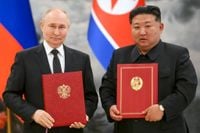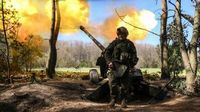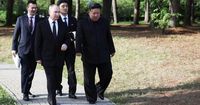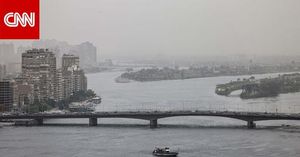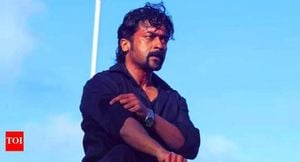In a significant escalation of military cooperation, Russian President Vladimir Putin has publicly acknowledged the deployment of North Korean soldiers in the ongoing conflict against Ukraine. This marks a notable shift in the relationship between the two nations, as Putin praised the contributions of these troops in a statement made on April 28, 2025, just two days after Russia claimed to have fully recaptured the Kursk region from Ukrainian forces. "Our Korean friends acted out of a sense of solidarity, justice and genuine comradeship," Putin stated, highlighting the heroism and training of North Korean soldiers who fought alongside Russian forces.
North Korea's involvement in the conflict had been a subject of speculation for months, but it was only on this day that Kim Jong Un confirmed the deployment, referring to the North Korean troops as "heroes" who fought to liberate the Kursk area from what he termed the "Ukrainian neo-Nazi occupiers." This admission was reported by the state-run news agency KCNA, which described the military operations as a successful effort to repel Ukrainian forces.
Prior to this official acknowledgment, intelligence reports from the United States, South Korea, and Ukraine had estimated that between 10,000 and 14,000 North Korean soldiers had been sent to Russia, marking the regime's first significant military engagement since the Korean War. South Korean military officials indicated that approximately 4,000 North Korean soldiers had been killed or wounded in the conflict, with an additional 3,000 troops dispatched earlier this year to bolster their ranks.
Putin's remarks about the North Korean troops came as Germany's Defense Minister Boris Pistorius criticized U.S. proposals for a ceasefire, labeling them as "a capitulation." He emphasized that while Ukraine might have to consider territorial sacrifices for peace, it should not concede as much as what the latest American proposal suggested. This backdrop of diplomatic tension underscores the complex negotiations surrounding the conflict, with multiple parties vying for influence.
The U.S. has expressed deep concern over North Korea's military involvement, calling for an end to its support of Russia. A State Department spokesperson stated that North Korea's direct participation in the war perpetuates the conflict, holding both nations accountable for their actions. Kim Jong Un's confirmation of troop deployments under a mutual defense treaty signed with Putin in June 2024 highlights the growing military alliance between the two nations.
In his statements, Kim emphasized the necessity of honoring the sacrifices of fallen soldiers, announcing plans to erect a monument in Pyongyang to commemorate their contributions. He described the soldiers as representatives of the honor of the motherland, further solidifying the narrative of North Korea's involvement as a heroic endeavor.
Despite the North Korean leadership's rhetoric, the reality on the battlefield presents challenges. Ukrainian officials have consistently disputed Russian claims of territorial gains, asserting that their forces continue to hold strategic positions in Kursk. The Ukrainian military had initially launched a surprise offensive in August 2024, capturing parts of the region, which they aimed to use as leverage in future peace talks.
As the conflict unfolds, the implications of North Korea's military engagement extend beyond the immediate battlefield. Analysts suggest that this partnership not only strengthens Russia's position but also serves as a negotiating tool for North Korea, potentially allowing it to extract concessions from the international community. The dynamics of this alliance could reshape the geopolitical landscape, particularly as the U.S. pushes for a resolution to the conflict.
In a related development, U.S. Secretary of State Marco Rubio indicated that the upcoming week would be critical for peace negotiations, as pressure mounts for a resolution. Rubio's comments reflect the urgency felt by the U.S. administration to broker a deal, especially as President Donald Trump expressed frustration over the lack of progress in negotiations between Moscow and Kyiv.
Trump's recent discussions with Ukrainian President Volodymyr Zelensky at the Vatican included topics of ceasefire agreements and territorial disputes, particularly concerning Crimea, which remains a contentious issue. Zelensky has made it clear that recognizing Crimea as Russian territory would be a violation of Ukraine's sovereignty, complicating any potential agreements.
While North Korea's military involvement has garnered international condemnation, it also raises concerns about the potential for increased military cooperation between Pyongyang and Moscow. Observers warn that such ties could provide North Korea with essential military technology and economic support, further emboldening its regime.
As both Russia and North Korea navigate this complex web of alliances and conflicts, the impact of their military cooperation will likely reverberate across the international community. The situation remains fluid, with ongoing diplomatic efforts and military strategies evolving in response to the changing dynamics on the ground.
In summary, the acknowledgment of North Korean troops fighting alongside Russian forces marks a pivotal moment in the ongoing conflict in Ukraine, reflecting deepening ties between the two nations. As the international community grapples with the implications of this alliance, the potential for further escalation remains a pressing concern.
